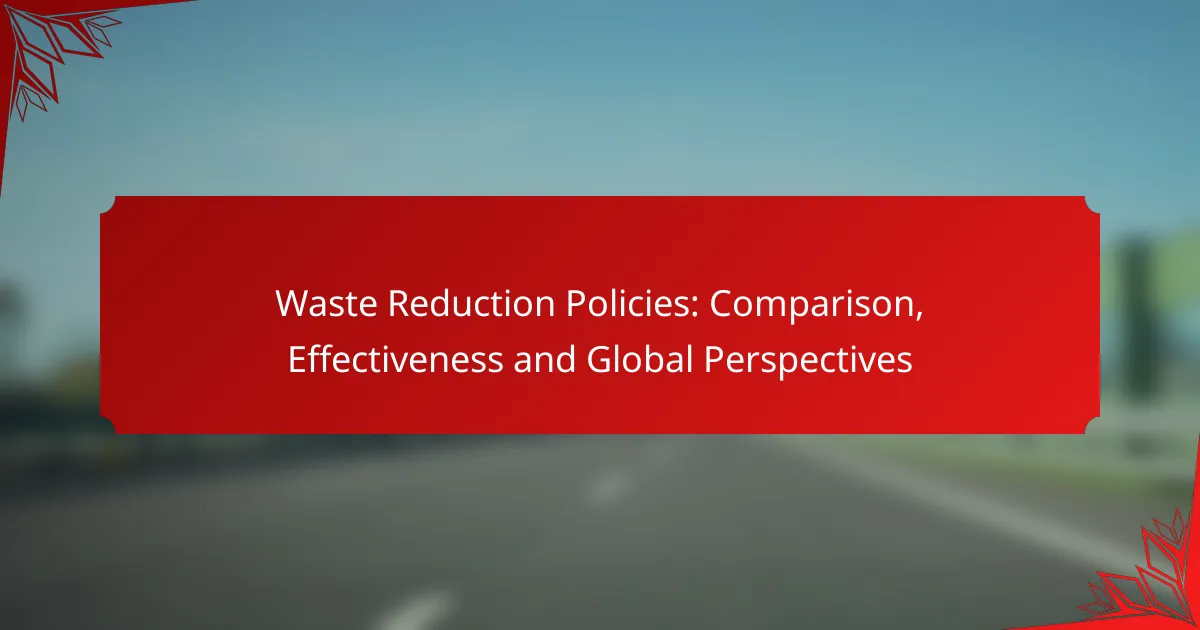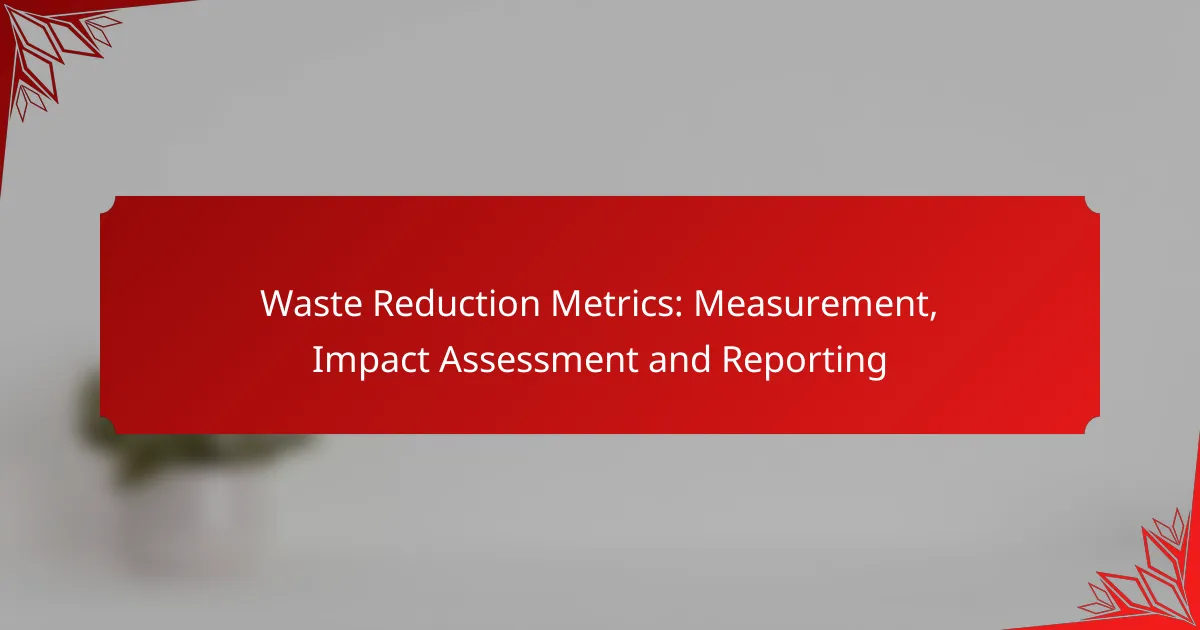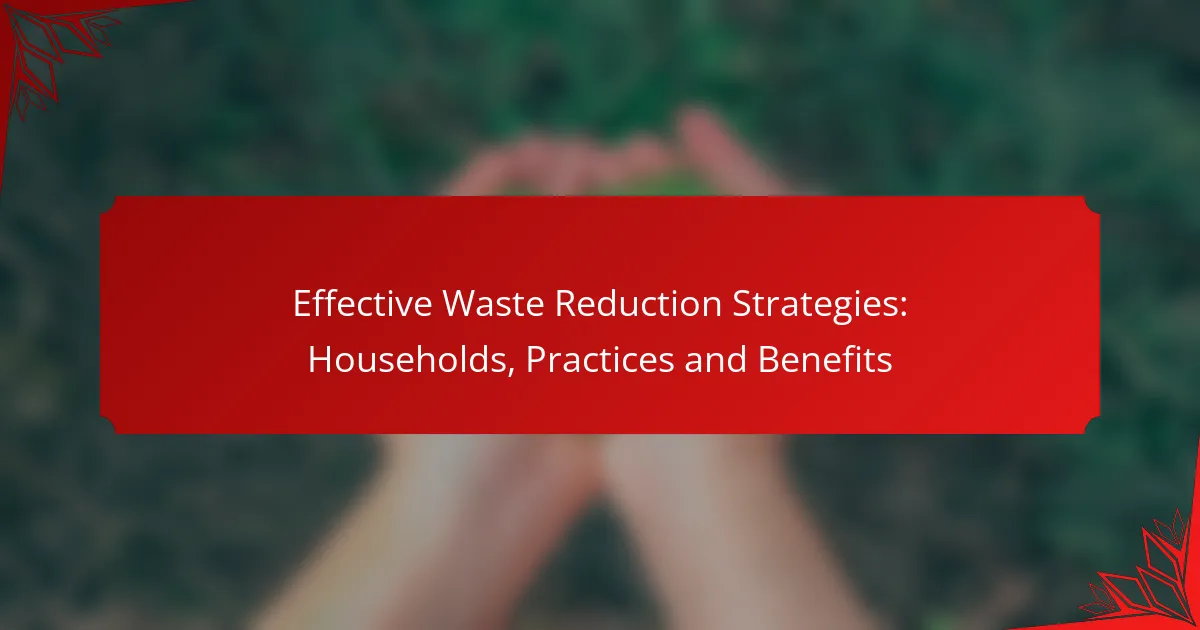Waste reduction policies play a crucial role in minimizing waste generation and promoting sustainable practices globally. These policies vary widely, shaped by cultural, economic, and regulatory contexts, and can include a mix of strict regulations and voluntary initiatives. Their effectiveness is often assessed through metrics such as landfill reduction, recycling rates, and cost savings for local governments, highlighting the importance of tailored approaches in different regions.
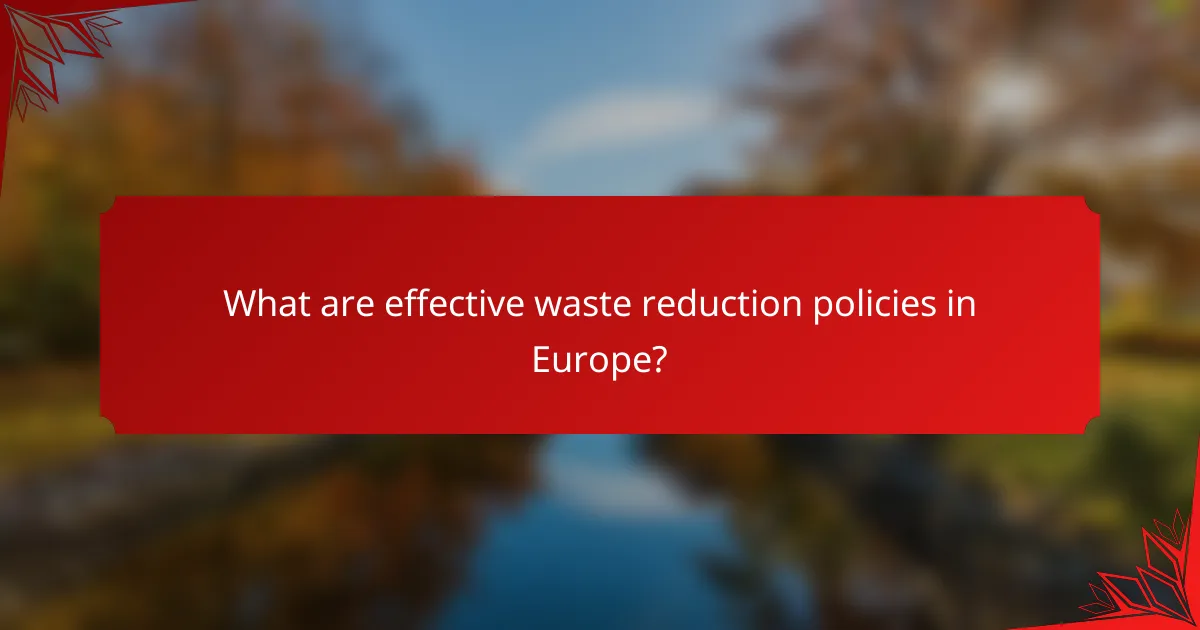
What are effective waste reduction policies in Europe?
Effective waste reduction policies in Europe focus on minimizing waste generation, promoting recycling, and fostering a circular economy. These policies often involve regulatory frameworks, financial incentives, and public awareness campaigns to encourage sustainable practices among businesses and consumers.
Germany’s Circular Economy Act
Germany’s Circular Economy Act aims to enhance resource efficiency and promote recycling by establishing clear targets for waste reduction. The law mandates that businesses take responsibility for the entire lifecycle of their products, encouraging them to design for recyclability and reduce packaging waste.
Key measures include mandatory recycling quotas and the implementation of deposit return schemes for beverage containers. These initiatives have led to significant increases in recycling rates, often exceeding 60% for municipal waste.
Sweden’s Waste Management Strategy
Sweden’s Waste Management Strategy emphasizes waste prevention and recycling, with a goal of achieving zero waste by 2045. The strategy includes a comprehensive waste sorting system that encourages households to separate recyclables, organic waste, and residual waste.
In addition, Sweden employs a tax on landfill waste, incentivizing businesses and municipalities to find alternative waste management solutions. This approach has resulted in high recycling rates, with over 99% of waste being recycled or used for energy recovery.
France’s Anti-Waste Law
France’s Anti-Waste Law, enacted in 2020, aims to reduce waste and promote a circular economy through several key provisions. It prohibits the destruction of unsold clothing and mandates that producers contribute to recycling and waste management efforts.
The law also encourages the use of reusable packaging and sets ambitious recycling targets, aiming for 100% of plastic packaging to be recycled by 2025. These measures are part of France’s broader commitment to sustainability and reducing environmental impact.
Netherlands’ Waste Separation Programs
The Netherlands has implemented extensive waste separation programs to enhance recycling and reduce landfill use. Municipalities provide residents with separate bins for organic waste, plastics, paper, and residual waste, making it easier for citizens to participate in recycling efforts.
In addition, the Dutch government offers financial incentives for businesses that adopt sustainable practices, such as reducing packaging waste. As a result, the country has seen a steady increase in recycling rates, with many municipalities achieving rates above 60%.
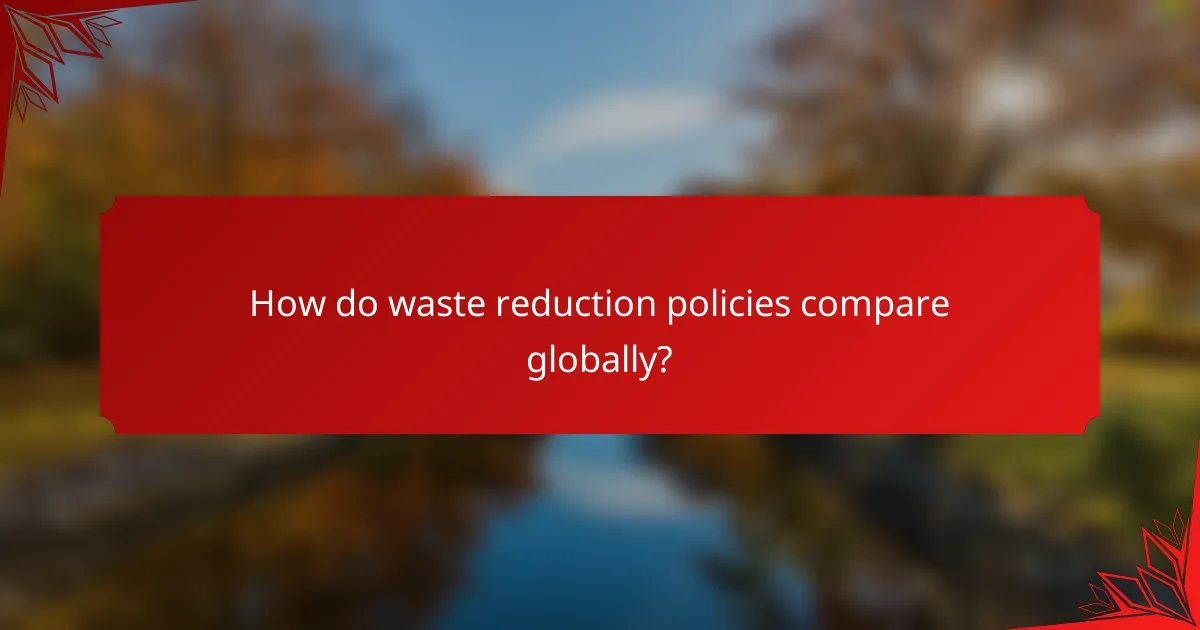
How do waste reduction policies compare globally?
Waste reduction policies vary significantly across the globe, influenced by cultural, economic, and regulatory factors. Countries implement diverse strategies, ranging from strict regulations to voluntary initiatives, each with varying degrees of effectiveness in reducing waste.
Comparison of European vs. Asian policies
European waste reduction policies often emphasize recycling and circular economy principles, with many countries setting ambitious targets for waste diversion from landfills. For instance, the European Union mandates member states to recycle at least 50% of municipal waste by 2020, with some countries exceeding this goal.
In contrast, Asian countries like Japan and South Korea have adopted innovative waste management practices, including advanced sorting technologies and community engagement programs. Japan’s “Mottainai” philosophy promotes resource conservation, while South Korea has implemented a pay-as-you-throw system that incentivizes waste reduction at the household level.
North America’s waste reduction initiatives
In North America, waste reduction initiatives vary widely by region, with some states and cities leading the way in sustainability efforts. For example, California has set a goal to achieve 75% recycling by 2020, supported by legislation that encourages composting and waste diversion.
However, challenges remain, as many areas still rely heavily on landfilling. Initiatives like the Zero Waste movement aim to minimize waste through comprehensive strategies that include reducing consumption, reusing materials, and recycling effectively.
Australia’s waste management frameworks
Australia’s waste management frameworks focus on reducing landfill reliance and increasing recycling rates. The National Waste Policy outlines strategies to achieve a circular economy, emphasizing the importance of product stewardship and community involvement in waste reduction efforts.
Local governments play a crucial role in implementing these policies, often introducing initiatives such as curbside recycling and educational campaigns. However, Australia faces challenges with contamination in recycling streams, highlighting the need for ongoing public education and improved sorting technologies.
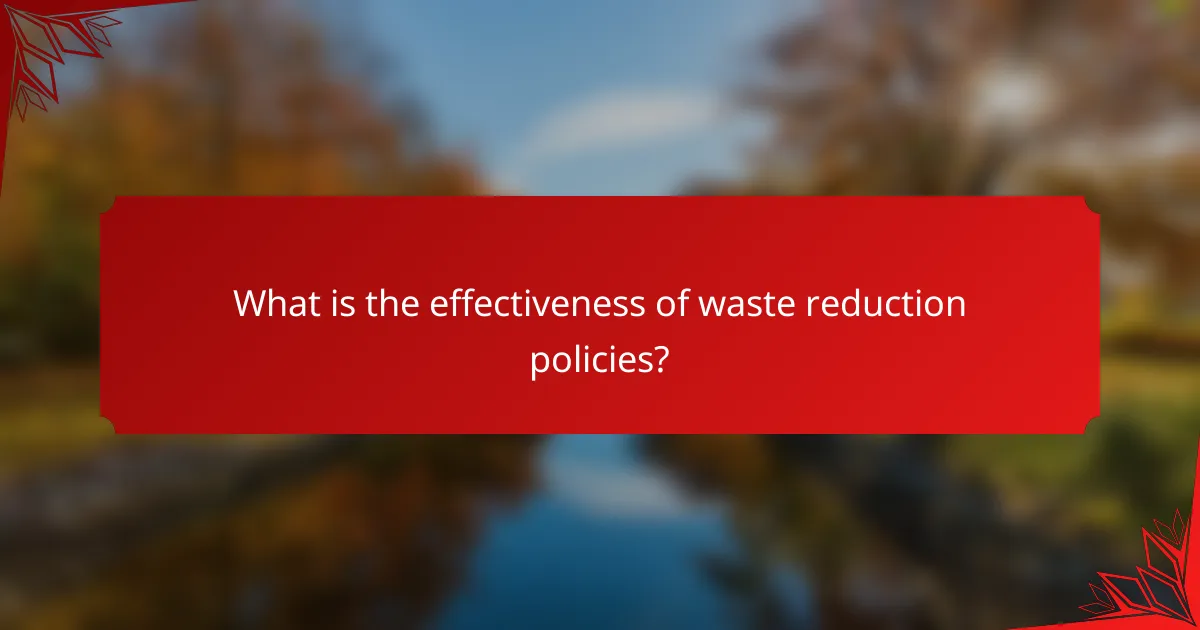
What is the effectiveness of waste reduction policies?
Waste reduction policies are effective tools for minimizing waste generation and promoting sustainable practices. Their success can be measured through various metrics, including landfill reduction, recycling improvements, and cost savings for local governments.
Impact on landfill reduction
Effective waste reduction policies significantly decrease the volume of waste sent to landfills. For instance, implementing strict regulations on single-use plastics can lead to a notable drop in landfill contributions, often by tens of percent over several years.
Countries with robust waste management frameworks, such as Germany and Sweden, have seen landfill diversion rates exceed 50%, demonstrating the potential impact of comprehensive policies. These measures often include incentives for businesses to reduce waste and penalties for excessive landfill use.
Recycling rate improvements
Policies aimed at waste reduction typically boost recycling rates by establishing clear guidelines and incentives. For example, deposit return schemes for beverage containers can increase recycling rates by 30-50% in regions where they are implemented.
Furthermore, educational campaigns that accompany these policies can enhance public awareness and participation in recycling programs, leading to a more sustainable waste management culture. Cities that invest in recycling infrastructure often report improvements in material recovery rates and reduced contamination in recycling streams.
Cost savings for municipalities
Waste reduction policies can lead to significant cost savings for municipalities by lowering waste disposal fees and reducing the need for new landfill sites. For instance, communities that adopt comprehensive recycling and composting programs may save millions in landfill costs annually.
Additionally, investing in waste reduction initiatives can create jobs and stimulate local economies, further offsetting initial implementation costs. Municipalities should consider the long-term financial benefits of these policies, as they often yield a return on investment within a few years.
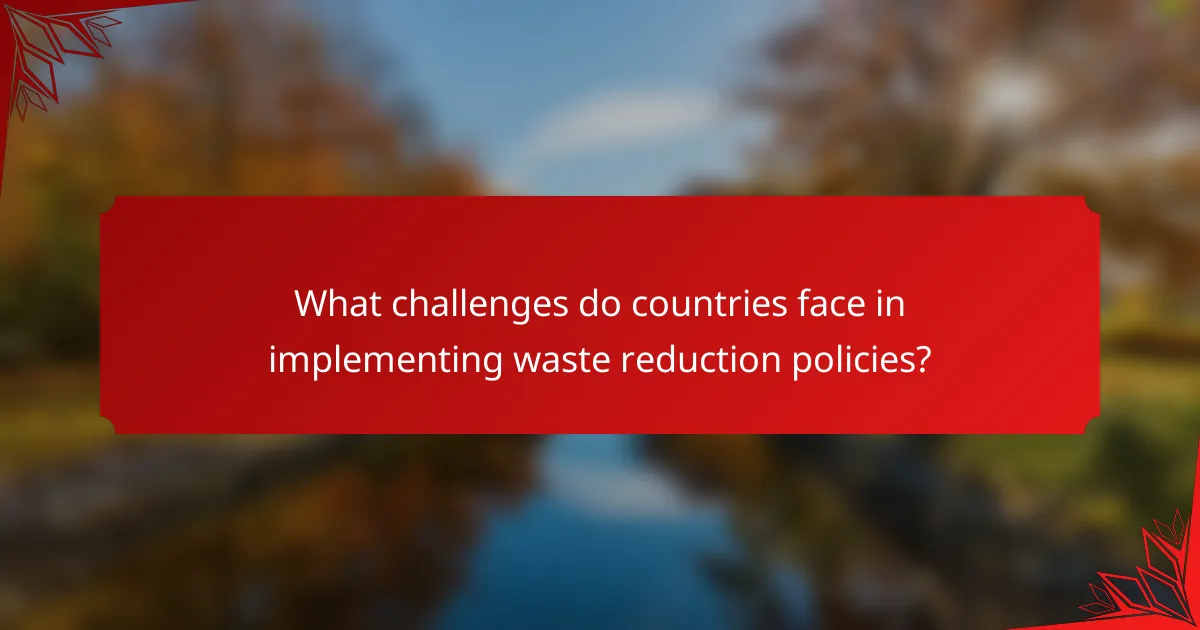
What challenges do countries face in implementing waste reduction policies?
Countries encounter several challenges when implementing waste reduction policies, including public awareness, economic constraints, and regulatory enforcement issues. These factors can significantly hinder the effectiveness of initiatives aimed at minimizing waste generation and promoting sustainable practices.
Public awareness and education
Lack of public awareness is a major barrier to effective waste reduction policies. Many individuals are unaware of the environmental impact of waste or the benefits of reducing, reusing, and recycling materials. Educational campaigns can help bridge this gap, but they require consistent funding and commitment from governments and organizations.
To improve public understanding, countries can implement community workshops, school programs, and social media campaigns that highlight the importance of waste reduction. Engaging local communities in clean-up events can also foster a sense of responsibility and ownership over waste management practices.
Economic constraints
Economic constraints often limit the resources available for waste reduction initiatives. Many countries face budgetary restrictions that can affect the implementation of comprehensive waste management systems. Investing in recycling infrastructure or public education campaigns can be challenging when funds are tight.
Governments can explore partnerships with private sectors or international organizations to secure funding for waste reduction projects. Additionally, incentivizing businesses to adopt sustainable practices through tax breaks or grants can alleviate some financial burdens and encourage broader participation in waste reduction efforts.
Regulatory enforcement issues
Effective enforcement of waste reduction regulations is crucial, yet many countries struggle with this aspect. Insufficient regulatory frameworks, lack of trained personnel, and inadequate monitoring systems can lead to poor compliance with waste management policies. Without proper enforcement, even the best-designed policies may fail to achieve their intended outcomes.
To strengthen regulatory enforcement, countries should consider investing in training for waste management personnel and developing clear guidelines for compliance. Utilizing technology, such as waste tracking systems, can also enhance monitoring efforts and ensure that regulations are followed effectively.

How do cultural factors influence waste reduction efforts?
Cultural factors significantly shape waste reduction efforts by influencing community behaviors, values, and practices. Societal norms, traditions, and local regulations can either promote or hinder effective waste management strategies.
Community engagement in Japan
In Japan, community engagement plays a crucial role in waste reduction. The country emphasizes the importance of local participation through initiatives like neighborhood clean-up events and recycling programs. Residents are often involved in sorting waste, which fosters a collective responsibility towards minimizing waste.
Japanese culture values harmony and social responsibility, which encourages individuals to adhere to strict waste separation guidelines. For example, many municipalities have specific days for different types of waste collection, promoting awareness and compliance among citizens.
Behavioral changes in Scandinavian countries
Scandinavian countries, known for their strong environmental policies, have successfully implemented behavioral changes that support waste reduction. These nations prioritize sustainability education, which instills eco-friendly habits from a young age. Programs in schools often include lessons on recycling and composting, leading to a more environmentally conscious population.
In countries like Sweden and Denmark, government incentives encourage citizens to reduce waste, such as deposit return schemes for bottles and cans. These initiatives not only promote recycling but also create a culture where reducing waste is seen as a civic duty, significantly impacting overall waste management practices.

What role do businesses play in waste reduction?
Businesses play a crucial role in waste reduction by implementing strategies that minimize waste generation and promote recycling. Through sustainable practices, companies can significantly decrease their environmental impact while often reducing costs associated with waste disposal.
Corporate sustainability initiatives
Corporate sustainability initiatives focus on integrating environmentally friendly practices into business operations. This can include reducing packaging materials, optimizing supply chains, and adopting circular economy principles where waste is repurposed. Companies like Unilever and Coca-Cola have set ambitious goals to achieve zero waste in their operations.
To effectively implement these initiatives, businesses should conduct waste audits to identify key areas for improvement. Setting measurable targets and regularly reviewing progress can help maintain momentum and accountability. Engaging employees in sustainability training can also foster a culture of waste reduction.
Partnerships with local governments
Partnerships with local governments can enhance waste reduction efforts by aligning business practices with community goals. Collaborating on recycling programs or waste management initiatives can lead to more efficient resource use and improved public awareness. For example, businesses can participate in local clean-up events or support municipal recycling campaigns.
When forming these partnerships, businesses should seek to understand local regulations and incentives that promote waste reduction. Establishing clear communication channels with local authorities can facilitate the sharing of resources and best practices, ultimately benefiting both the business and the community.
